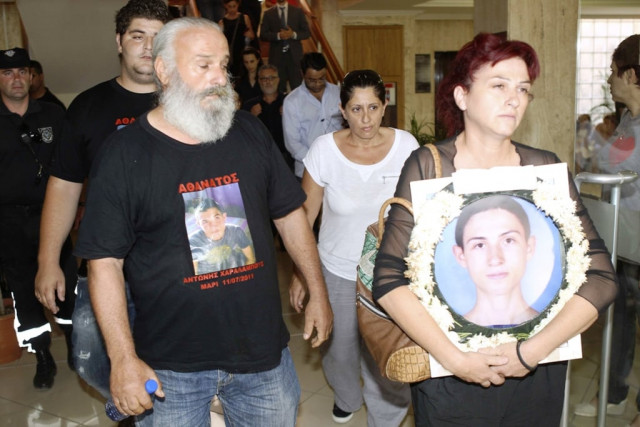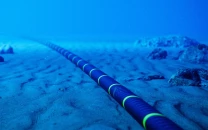Cyprus ex-defence minister, 3 firemen guilty over blast
It is said to be the first time in island's legal history that so many senior officials faced such serious charges.

Relatives of victims of a munitions explosion in Cyprus in 2011 emerge from a courthouse in the coastal town of Larnaca July 9, 2013. PHOTO: REUTERS
Papacostas was also found guilty of causing death through negligence, but the more serious charge of manslaughter carries a maximum sentence of life in prison.
Ex-foreign minister Marcos Kyprianou and army deputy commander Savvas Argyrou were found not guilty on all charges by the criminal court in the southern city of Larnaca.
Relatives of those killed and injured in the blast on July 11, 2011 at the island's Mari naval base on the south coast expressed anger at the verdicts, which they described as an "injustice".
They claimed all the defendants "and many more" should go to prison for life.
The fire chiefs A Nicolaou, Pambos Charalambous and A Loizides face up to four years in prison each. The three were also found guilty of reckless or dangerous behaviour.
They and Papacostas will reappear in court for sentencing on July 24 and arguments for leniency.
It is said to be the first time in the island's legal history that so many senior officials have faced such serious charges.
During the lengthy trial, the prosecution sought to represent a picture of staggering incompetence and oversights that led to the disaster.
A public inquiry found former president Demetris Christofias responsible for the explosion, but there was never any possibility of legal proceedings against him as the constitution gives him immunity from prosecution.
Burning containers with 400 tonnes of gunpowder triggered an estimated 1.5 megaton blast that damaged 730 homes and businesses.
There was a public outcry after munitions stored at the naval base for almost three years, under searing heat in summer, exploded despite repeated warnings that they were unsafe.
Some 98 containers were piled up unprotected at the base, just 150 metres (yards) from the island's biggest power station at Vassiliko.
They were seized in February 2009 when Cyprus intercepted a Cypriot-flagged freighter bound from Iran for Syria and a UN sanctions committee said the cargo contravened a ban on Iranian arms shipments.
"The control and responsibility of the cargo belonged to Costas Papacostas. Marcos Kyprianou only carried out the policy of the president of the republic," the court ruled.
The court said "the former ministers of foreign affairs and defence, Marcos Kyprianou and Costas Papacostas, attempted to downplay the dangers of the cargo containing the explosives in Mari and ignored the danger signs".
It said Papacostas was "well aware of the deadly dangers" while claiming that fire chiefs Charalambous and Loizides were also aware of the dangers posed by the cargo, adding that the "containers were left to their own fate".
There was a public outcry after the munitions exploded despite repeated warnings that they were unsafe.
Angry Cypriots used social networking sites and texting to organise street protests against what they perceived as government negligence in not preventing the accident.
Christofias said the decision to keep the weapons on the island was "correct" and refused to step down despite the demands of protesters that he quit.
The public inquiry said the munitions were kept in Cyprus to placate Syria and Iran in a risky diplomatic game.
Hitherto good Cyprus relations with Iran and Syria were strained by the incident.
The loss of the power plant led to rolling daily power cuts and, as Cyprus withered under scorching summer temperatures, authorities had to import generators from Israel and Greece while seeking EU crisis funds.
The disruption crippled the island's economy with many arguing that the cost – estimated at three billion euros – sowed the seeds of the debt crisis that forced the government to submit a request the following year for a bailout by international creditors.
The deal the government eventually struck in March this year for emergency loans worth 10 billion euros required Cyprus to levy an unprecedented 13 billion euro levy on larger deposits in the island's two biggest banks.


















COMMENTS
Comments are moderated and generally will be posted if they are on-topic and not abusive.
For more information, please see our Comments FAQ